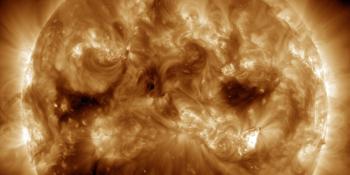Viewing archive of Monday, 11 September 2017
Solar activity report
Any mentioned solar flare in this report has a scaling factor applied by the Space Weather Prediction Center (SWPC). Because of the SWPC scaling factor, solar flares are reported as 42% smaller than for the science quality data. The scaling factor has been removed from our archived solar flare data to reflect the true physical units.
Report of Solar-Geophysical Activity 2017 Sep 11 2200 UTCPrepared by the NOAA © SWPC and processed by SpaceWeatherLive.com
Joint USAF/NOAA Report of Solar and Geophysical Activity
SDF Number 254 Issued at 2200Z on 11 Sep 2017IA. Analysis of Solar Active Regions and Activity from 10-2100Z to 11-2100Z Solar activity has been at low levels for the past 24 hours.
There are currently 2 numbered sunspot regions on the disk.
IB. Solar Activity Forecast
Solar activity is expected to be very low
with a chance for a C-class flares and a slight chance for an M-class
flare on day one (12 Sep) and expected to be very low with a slight
chance for a C-class flare on day two (13 Sep) and expected to be very
low on day three (14 Sep).
IIA. Geophysical Activity Summary 10-2100Z to 11-2100Z
The geomagnetic
field has been at quiet to active levels for the past 24 hours. Solar
wind speed reached a peak of 668 km/s at 11/0203Z. Total IMF reached 7
nT at 10/2328Z. The maximum southward component of Bz reached -5 nT at
10/2330Z. Protons greater than 10 MeV at geosynchronous orbit reached a
peak level of 1493 pfu at 11/1145Z. Protons greater than 100 MeV at
geosynchronous orbit reached a peak level of 68 pfu at 10/2215Z.
Electrons greater than 2 MeV at geosynchronous orbit reached a peak
level of 5361 pfu.
IIB. Geophysical Activity Forecast
The geomagnetic field is expected
to be at quiet to active levels on day one (12 Sep), unsettled to major
storm levels on day two (13 Sep) and unsettled to minor storm levels on
day three (14 Sep). Protons are expected to cross threshold on day one
(12 Sep), are expected to cross threshold on day two (13 Sep) and are
likely to cross threshold on day three (14 Sep).
III. Event Probabilities 12 Sep to 14 Sep
| Class M | 10% | 01% | 01% |
| Class X | 01% | 01% | 01% |
| Proton | 99% | 80% | 60% |
| PCAF | red | ||
IV. Penticton 10.7 cm Flux
Observed 11 Sep 080 Predicted 12 Sep-14 Sep 078/076/076 90 Day Mean 11 Sep 081
V. Geomagnetic A Indices
Observed Afr/Ap 10 Sep 012/007 Estimated Afr/Ap 11 Sep 012/014 Predicted Afr/Ap 12 Sep-14 Sep 010/012-024/040-025/034
VI. Geomagnetic Activity Probabilities 12 Sep to 14 Sep
| A. Middle Latitudes | |||
|---|---|---|---|
| Active | 25% | 25% | 30% |
| Minor storm | 10% | 35% | 35% |
| Major-severe storm | 01% | 20% | 20% |
| B. High Latitudes | |||
|---|---|---|---|
| Active | 15% | 05% | 05% |
| Minor storm | 30% | 20% | 15% |
| Major-severe storm | 40% | 75% | 75% |
All times in UTC
Latest news
Latest forum messages
AR4046 136AR4048 35Solar Demon 3Unspecified geomagnetic activity 2146Aurora photography hints for those of us with smartphones 54
More topicsSupport SpaceWeatherLive.com!
A lot of people come to SpaceWeatherLive to follow the Sun's activity or if there is aurora to be seen, but with more traffic comes higher server costs. Consider a donation if you enjoy SpaceWeatherLive so we can keep the website online!

Space weather facts
| Last X-flare | 2025/03/28 | X1.1 |
| Last M-flare | 2025/03/30 | M1.0 |
| Last geomagnetic storm | 2025/03/27 | Kp5 (G1) |
| Spotless days | |
|---|---|
| Last spotless day | 2022/06/08 |
| Monthly mean Sunspot Number | |
|---|---|
| February 2025 | 154.6 +17.6 |
| March 2025 | 127 -27.6 |
| Last 30 days | 127 -25.7 |


